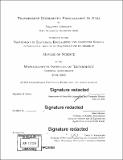| dc.contributor.advisor | Alan Edelman. | en_US |
| dc.contributor.author | Churavy, Valentin(Valentin Roland) | en_US |
| dc.contributor.other | Massachusetts Institute of Technology. Department of Electrical Engineering and Computer Science. | en_US |
| dc.date.accessioned | 2019-11-04T20:22:39Z | |
| dc.date.available | 2019-11-04T20:22:39Z | |
| dc.date.copyright | 2019 | en_US |
| dc.date.issued | 2019 | en_US |
| dc.identifier.uri | https://hdl.handle.net/1721.1/122755 | |
| dc.description | Thesis: S.M., Massachusetts Institute of Technology, Department of Electrical Engineering and Computer Science, 2019 | en_US |
| dc.description | Cataloged from PDF version of thesis. | en_US |
| dc.description | Includes bibliographical references (pages 39-44). | en_US |
| dc.description.abstract | Scientific and engineering problems grow ever larger and more challenging, solving them requires taking advantage of domain expertise and modern compute capabilities. This encourages efficient usage of GPUs and using large scale cluster environments efficiently. Domain experts should not need to acquire the deep knowledge required to develop applications that scale, but rather should be able to express data science and engineering problems in terms of vectorized operations and linear algebra, that is in language inherent to the field. The approach introduced here, gives performance engineers access to low-level capabilities of the hardware, allowing them to collaborate with domain experts in the same language. This removes the need to rewrite scientific code in a low-level language, speeding up the iteration cycle and allowing for rapid prototyping. We investigate composable, layered abstractions for scientific computing. They separate the user intent, the what, from the how of the implementation and the where of the execution. The focus is on the distributed aspects, how array abstractions for distributed and accelerated computing can compose with each other and how we can provide access to low-level capabilities in a transparent fashion. Building and debugging these abstractions is challenging. This work introduces Cthulhu, a unique debugging tool for abstractions, that takes into consideration the dynamic execution model and the static compilation process of Julia. | en_US |
| dc.description.sponsorship | "This research is supported in part by NSF DMS-1312831, NSF OAC-1835443, Darpa XDATA, and an ARAMCO MITEI grant" | en_US |
| dc.description.statementofresponsibility | by Valentin Churavy. | en_US |
| dc.format.extent | 44 pages | en_US |
| dc.language.iso | eng | en_US |
| dc.publisher | Massachusetts Institute of Technology | en_US |
| dc.rights | MIT theses are protected by copyright. They may be viewed, downloaded, or printed from this source but further reproduction or distribution in any format is prohibited without written permission. | en_US |
| dc.rights.uri | http://dspace.mit.edu/handle/1721.1/7582 | en_US |
| dc.subject | Electrical Engineering and Computer Science. | en_US |
| dc.title | Transparent distributed programming in Julia | en_US |
| dc.type | Thesis | en_US |
| dc.description.degree | S.M. | en_US |
| dc.contributor.department | Massachusetts Institute of Technology. Department of Electrical Engineering and Computer Science | en_US |
| dc.identifier.oclc | 1124856175 | en_US |
| dc.description.collection | S.M. Massachusetts Institute of Technology, Department of Electrical Engineering and Computer Science | en_US |
| dspace.imported | 2019-11-04T20:22:38Z | en_US |
| mit.thesis.degree | Master | en_US |
| mit.thesis.department | EECS | en_US |
